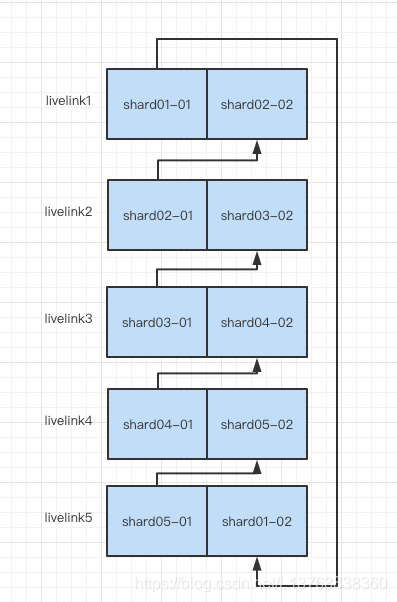1. 问题描述
自建clickhouse集群,遇到几个问题:
- 建表不同步
- 插入数据不同步
- 查询数据不一致
其实均与配置有关,其中数据不一致问题,纠结比较久,这里总结分享一下。
2. 集群设计
clickhouse集群配置:5节点,每个节点2个实例,总共5个分片,每个分片2副本。
整理表格如下
| 节点 | 实例1 | 实例2 |
| livelink1 |
livelink1:9000 分片01-副本01 |
livelink1:9002 分片02-副本02 |
| livelink2 |
livelink2:9000 分片02-副本01 |
livelink2:9002 分片03-副本02 |
| livelink3 |
livelink3:9000 分片03-副本01 |
livelink3:9002 分片04-副本02 |
| livelink4 |
livelink4:9000 分片04-副本01 |
livelink4:9002 分片05-副本02 |
| livelink5 |
livelink5:9000 分片05-副本01 |
livelink1:9002 分片01-副本02 |
架构设置如

3. 实例配置
3.1 config-node1.xml
以livelink1节点的实例1的config-node1.xml为例,标注红色部分是需要根据节点实例进行修改或者需要特别注意的
<?xml version=”1.0″?>
<yandex>
<logger>
<level>trace</level>
<log>/var/log/clickhouse-server/clickhouse-server-node1.log</log>
<errorlog>/var/log/clickhouse-server/clickhouse-server-node1.err.log</errorlog>
<size>1000M</size>
<count>10</count>
</logger>
<!– 根据具体节点和实例进行修改 –>
<http_port>8081</http_port>
<listen_host>::</listen_host>
<tcp_port>9000</tcp_port>
<mysql_port>9004</mysql_port>
<postgresql_port>9005</postgresql_port>
<interserver_http_port>9009</interserver_http_port>
<interserver_http_host>livelink1</interserver_http_host>
<path>/data/clickhouse/node1/</path>
<tmp_path>/data/clickhouse/node1/tmp/</tmp_path>
<format_schema_path>/data/clickhouse/node1/format_schemas/</format_schema_path>
<user_files_path>/data/clickhouse/node1/user_files/</user_files_path>
<user_directories>
<users_xml>
<path>users-node1.xml</path>
</users_xml>
<local_directory>
<path>/data/clickhouse/node1/access/</path>
</local_directory>
</user_directories>
<!– clickhouse_remote_servers、 zookeeper-servers、macros命名要与metrika-node1.xml中一致–>
<include_from>/etc/clickhouse-server/metrika-node1.xml</include_from>
<remote_servers incl=”clickhouse_remote_servers” />
<zookeeper incl=”zookeeper-servers” optional=”true” />
<macros incl=”macros” optional=”true” />
<max_connections>4096</max_connections>
<keep_alive_timeout>3</keep_alive_timeout>
<max_concurrent_queries>100</max_concurrent_queries>
<max_server_memory_usage>0</max_server_memory_usage>
<max_thread_pool_size>10000</max_thread_pool_size>
<max_server_memory_usage_to_ram_ratio>0.9</max_server_memory_usage_to_ram_ratio>
<total_memory_profiler_step>4194304</total_memory_profiler_step>
<total_memory_tracker_sample_probability>0</total_memory_tracker_sample_probability>
<uncompressed_cache_size>8589934592</uncompressed_cache_size>
<mark_cache_size>5368709120</mark_cache_size>
<mmap_cache_size>1000</mmap_cache_size>
<compiled_expression_cache_size>1073741824</compiled_expression_cache_size><default_profile>default</default_profile>
<custom_settings_prefixes></custom_settings_prefixes>
<default_database>default</default_database><mlock_executable>true</mlock_executable>
<!– Reallocate memory for machine code (“text”) using huge pages. Highly experimental. –>
<remap_executable>false</remap_executable><builtin_dictionaries_reload_interval>3600</builtin_dictionaries_reload_interval>
<max_session_timeout>3600</max_session_timeout>
<default_session_timeout>60</default_session_timeout><query_log>
<database>system</database>
<table>query_log</table>
<partition_by>toYYYYMM(event_date)</partition_by>
<flush_interval_milliseconds>7500</flush_interval_milliseconds>
</query_log><trace_log>
<database>system</database>
<table>trace_log</table>
<partition_by>toYYYYMM(event_date)</partition_by>
<flush_interval_milliseconds>7500</flush_interval_milliseconds>
</trace_log><query_thread_log>
<database>system</database>
<table>query_thread_log</table>
<partition_by>toYYYYMM(event_date)</partition_by>
<flush_interval_milliseconds>7500</flush_interval_milliseconds>
</query_thread_log><metric_log>
<database>system</database>
<table>metric_log</table>
<flush_interval_milliseconds>7500</flush_interval_milliseconds>
<collect_interval_milliseconds>1000</collect_interval_milliseconds>
</metric_log><asynchronous_metric_log>
<database>system</database>
<table>asynchronous_metric_log</table>
<flush_interval_milliseconds>60000</flush_interval_milliseconds>
</asynchronous_metric_log><!–
OpenTelemetry log contains OpenTelemetry trace spans.
–>
<opentelemetry_span_log>
<engine>
engine MergeTree
partition by toYYYYMM(finish_date)
order by (finish_date, finish_time_us, trace_id)
</engine>
<database>system</database>
<table>opentelemetry_span_log</table>
<flush_interval_milliseconds>7500</flush_interval_milliseconds>
</opentelemetry_span_log>
<crash_log>
<database>system</database>
<table>crash_log</table><partition_by />
<flush_interval_milliseconds>1000</flush_interval_milliseconds>
</crash_log>
<top_level_domains_lists></top_level_domains_lists>
<dictionaries_config>*_dictionary.xml</dictionaries_config>
<distributed_ddl>
<path>/clickhouse/task_queue/ddl</path>
</distributed_ddl><graphite_rollup_example>
<pattern>
<regexp>click_cost</regexp>
<function>any</function>
<retention>
<age>0</age>
<precision>3600</precision>
</retention>
<retention>
<age>86400</age>
<precision>60</precision>
</retention>
</pattern>
<default>
<function>max</function>
<retention>
<age>0</age>
<precision>60</precision>
</retention>
<retention>
<age>3600</age>
<precision>300</precision>
</retention>
<retention>
<age>86400</age>
<precision>3600</precision>
</retention>
</default>
</graphite_rollup_example>
<query_masking_rules>
<rule>
<name>hide encrypt/decrypt arguments</name>
<regexp>((?:aes_)?(?:encrypt|decrypt)(?:_mysql)?)\s*\(\s*(?:'(?:\\’|.)+’|.*?)\s*\)</regexp>
<replace>\1(???)</replace>
</rule>
</query_masking_rules><send_crash_reports>
<enabled>false</enabled>
<anonymize>false</anonymize>
<endpoint>https://6f33034cfe684dd7a3ab9875e57b1c8d@o388870.ingest.sentry.io/5226277</endpoint>
</send_crash_reports>
<http_server_default_response><![CDATA[<html ng-app=”SMI2″><head><base href=”http://ui.tabix.io/”></head><body><div ui-view=”” class=”content-ui”></div><script src=”http://loader.tabix.io/master.js”></script></body></html>]]></http_server_default_response>
</yandex>
3.2 user-node1.xml
<?xml version=”1.0″?>
<yandex>
<profiles>
<default>
<max_memory_usage>10000000000</max_memory_usage>
<load_balancing>random</load_balancing>
</default>
<readonly>
<readonly>1</readonly>
</readonly>
</profiles><users>
<!– 配置两个账户,一个可读写,一个只读 –>
<livelink_rw>
<password>xxx</password>
<networks>
<ip>::/0</ip>
</networks>
<profile>default</profile>
<quota>default</quota>
</livelink_rw>
<livelink_r>
<password>xxx</password>
<networks>
<ip>::/0</ip>
</networks>
<profile>readonly</profile>
<quota>default</quota>
</livelink_r>
</users><!– Quotas. –>
<quotas>
<!– Name of quota. –>
<default>
<!– Limits for time interval. You could specify many intervals with different limits. –>
<interval>
<!– Length of interval. –>
<duration>3600</duration><!– No limits. Just calculate resource usage for time interval. –>
<queries>0</queries>
<errors>0</errors>
<result_rows>0</result_rows>
<read_rows>0</read_rows>
<execution_time>0</execution_time>
</interval>
</default>
</quotas>
</yandex>
3.3 metrika-node1.xml
<?xml version=”1.0″?>
<yandex>
<!–server相关配置–>
<clickhouse_remote_servers>
<livelink_cluster>
<shard>
<weight>1</weight>
<internal_replication>true</internal_replication>
<replica>
<host>livelink1</host>
<port>9000</port>
<user>livelink_rw</user>
<password>livelink123</password>
</replica>
<replica>
<host>livelink5</host>
<port>9002</port>
<user>livelink_rw</user>
<password>livelink123</password>
</replica>
</shard>
<shard>
<weight>1</weight>
<internal_replication>true</internal_replication>
<replica>
<host>livelink1</host>
<port>9002</port>
<user>livelink_rw</user>
<password>livelink123</password>
</replica>
<replica>
<host>livelink2</host>
<port>9000</port>
<user>livelink_rw</user>
<password>livelink123</password>
</replica>
</shard>
<shard>
<weight>1</weight>
<internal_replication>true</internal_replication>
<replica>
<host>livelink2</host>
<port>9002</port>
<user>livelink_rw</user>
<password>livelink123</password>
</replica>
<replica>
<host>livelink3</host>
<port>9000</port>
<user>livelink_rw</user>
<password>livelink123</password>
</replica>
</shard>
<shard>
<weight>1</weight>
<internal_replication>true</internal_replication>
<replica>
<host>livelink3</host>
<port>9002</port>
<user>livelink_rw</user>
<password>livelink123</password>
</replica>
<replica>
<host>livelink4</host>
<port>9000</port>
<user>livelink_rw</user>
<password>livelink123</password>
</replica>
</shard>
<shard>
<weight>1</weight>
<internal_replication>true</internal_replication>
<replica>
<host>livelink4</host>
<port>9002</port>
<user>livelink_rw</user>
<password>livelink123</password>
</replica>
<replica>
<host>livelink5</host>
<port>9000</port>
<user>livelink_rw</user>
<password>livelink123</password>
</replica>
</shard>
</livelink_cluster>
</clickhouse_remote_servers>
<!–zookeeper相关配置–>
<zookeeper-servers>
<node index=”1″>
<host>livelink1</host>
<port>2181</port>
</node>
<node index=”2″>
<host>livelink2</host>
<port>2181</port>
</node>
<node index=”3″>
<host>livelink3</host>
<port>2181</port>
</node>
<node index=”4″>
<host>livelink4</host>
<port>2181</port>
</node>
<node index=”5″>
<host>livelink5</host>
<port>2181</port>
</node>
</zookeeper-servers>
<macros>
<layer>01</layer>
<shard>01</shard>
<replica>01-01-01</replica>
</macros>
<networks>
<ip>::/0</ip>
</networks><clickhouse_compression>
<case>
<min_part_size>10000000000</min_part_size>
<min_part_size_ratio>0.01</min_part_size_ratio>
<method>lz4</method>
</case>
</clickhouse_compression>
</yandex>
metrika-node1.xml中的clickhouse_remote_servers、zookeeper-servers、
macros
必须在config-node1.xml配置且命名一致,很重要!否则定义的
macros
不可用、表或者数据不能同步。
<include_from>/etc/clickhouse-server/metrika-node1.xml</include_from>
<remote_servers incl=”clickhouse_remote_servers” />
<zookeeper incl=”zookeeper-servers” optional=”true” />
<macros incl=”macros” optional=”true” />
每个实例的metrika配置文件,
macros
需要单独配置。刚开始以为
macros
只是宏定义,用于建表指定zookkeeper的时候,其实
macros
配置准确很重要,否则会影响分布式表查询不一致!!
命名规则可以自定义,但所有实例要一致!上面规则是:layer-shard-replical,下面是每个实例的
macros
- 实例:livelink1:9000
<macros>
<layer>01</layer>
<shard>01</shard>
<replica>01-01-01</replica>
</macros>
- 实例:livelink1:9002
<macros>
<layer>01</layer>
<shard>02</shard>
<replica>01-02-02</replica>
</macros>
- 实例:livelink2:9000
<macros>
<layer>01</layer>
<shard>02</shard>
<replica>01-02-01</replica>
</macros>
- 实例:livelink2:9002
<macros>
<layer>01</layer>
<shard>03</shard>
<replica>01-03-02</replica>
</macros>
- 实例:livelink3:9000
<macros>
<layer>01</layer>
<shard>01</shard>
<replica>01-03-01</replica>
</macros>
- 实例:livelink3:9002
<macros>
<layer>01</layer>
<shard>04</shard>
<replica>01-04-02</replica>
</macros>
- 实例:livelink4:9000
<macros>
<layer>01</layer>
<shard>04</shard>
<replica>01-04-01</replica>
</macros>
- 实例:livelink4:9002
<macros>
<layer>01</layer>
<shard>05</shard>
<replica>01-05-02</replica>
</macros>
- 实例:livelink5:9000
<macros>
<layer>01</layer>
<shard>05</shard>
<replica>01-05-01</replica>
</macros>
- 实例:livelink5:90002
<macros>
<layer>01</layer>
<shard>01</shard>
<replica>01-01-02</replica>
</macros>
4. 验证数据
4.1 创建复制表
只需要在其中一个实际上执行,每个实例会创建本地表
建表的时候,字段类型需要注意大小写,比如Int32不能写成int32,String不能写成string或者STRING,不然会报错
CREATE TABLE test.test_local on cluster livelink_cluster (
CounterID UInt32,
StartDate Date,
Sign Int8,
IsNew UInt8,
VisitID UInt64,
UserID UInt64,
StartTime DateTime
) ENGINE = ReplicatedMergeTree(‘/clickhouse/tables/{shard}/test.test_local’, ‘{replica}’)
PARTITION BY toYYYYMM(StartDate)
ORDER BY (CounterID, StartDate, intHash32(UserID), VisitID)
SAMPLE BY intHash32(UserID)
SETTINGS index_granularity = 8192
4.2 创建分布式表
create table test.test_all on cluster livelink_cluster as test.test_local
ENGINE = Distributed(livelink_cluster,test,test_local,rand())
4.3 插入数据
livelink2:9000实例本地复制表插入数据
insert into test_local values(1, ‘2021-07-01 00:11:22’, 1, 1, 1, 11, toDateTime(‘2021-07-08 00:11:22’));
4.4 查询数据
按上面的架构图,在livelink2:9000和livelink1:9000实例本地复制表分配对应两个副本,都可以查到数据,其他实例本地表查询不到,但每个实例都可以通过分布式表查询得到
livelink1 🙂
select * from test.test_local;
SELECT *
FROM test.test_localQuery id: 1478d7ff-3885-45bc-b0bf-1c3111e51dcb
┌─CounterID─┬──StartDate─┬─Sign─┬─IsNew─┬─VisitID─┬─UserID─┬───────────StartTime─┐
│ 1 │ 2021-07-01 │ 1 │ 1 │ 1 │ 11 │ 2021-07-08 00:11:22 │
└───────────┴────────────┴──────┴───────┴─────────┴────────┴─────────────────────┘1 rows in set. Elapsed: 0.002 sec.
livelink1 🙂
select * from test.test_all;
SELECT *
FROM test.test_allQuery id: baf6b70d-2eaf-492a-b295-5ee9b6b226c3
┌─CounterID─┬──StartDate─┬─Sign─┬─IsNew─┬─VisitID─┬─UserID─┬───────────StartTime─┐
│ 1 │ 2021-07-01 │ 1 │ 1 │ 1 │ 11 │ 2021-07-08 00:11:22 │
└───────────┴────────────┴──────┴───────┴─────────┴────────┴─────────────────────┘1 rows in set. Elapsed: 0.005 sec.
查询分布式表的时候要多查几次,看是否每次查询数据准确、一致。本人就踩过坑,由于10个实例上都macros设置,其中xxx:9002实例上的设置错了,插入一条数据,分布式表每次查询的结果往往不一致,慎重!
5. 回顾总结
总的来说,自建clickhouse集群,可能会遇到下面几个问题,重点检查一下配置
- 建表不同步——检查macros、click_remote_server、zooker-server配置
- 插入数据不同步——检查macros、click_remote_server配置
- 查询数据不一致——检查macros配置